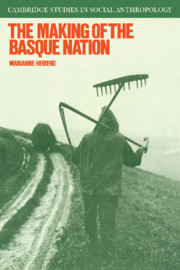Book contents
- Frontmatter
- Contents
- List of maps
- Preface
- Introduction: empire and the emergence of Spain
- Part 1 From plurality to Basque ethnic solidarity
- Part 2 Inside the moral community: the village of Elgeta, Guipúzcoa
- Introduction
- 8 Social organization in Elgeta
- 9 Morality manifested: village politics, 1872–1936
- 10 Hierarchy reimposed
- 11 Hierarchy dismantled
- Postscript
- Conclusion: ethnic nationalists and patron–clients in Southern Europe
- Notes
- Biblography
- Index
- Cambridge Studies in Social Anthropology
Introduction
Published online by Cambridge University Press: 19 October 2009
- Frontmatter
- Contents
- List of maps
- Preface
- Introduction: empire and the emergence of Spain
- Part 1 From plurality to Basque ethnic solidarity
- Part 2 Inside the moral community: the village of Elgeta, Guipúzcoa
- Introduction
- 8 Social organization in Elgeta
- 9 Morality manifested: village politics, 1872–1936
- 10 Hierarchy reimposed
- 11 Hierarchy dismantled
- Postscript
- Conclusion: ethnic nationalists and patron–clients in Southern Europe
- Notes
- Biblography
- Index
- Cambridge Studies in Social Anthropology
Summary
Basque nationalism was a response to two interrelated and powerful integrative forces. Basque industrialization economically integrated the Basque country from within. State centralization enforced political conformity from Madrid. In Basque nationalism these two forces relate to different levels of competitive struggle. With regard to Basque industrialization, Basque nationalism involves a dispute over the distribution of economic and political resources inside the Basque country. In this context Basque nationalism created a Basque nationalist community out of those social sectors which were peripheral to the main thrust of Basque industrialization. The ideology of nationalism endowed this community with exclusive ‘national’ legitimacy and thus with exclusive rights to claim Basque resources. The aspect of Basque nationalism I have termed internal nationalism concerns a competitive battle between the Basque nationalist community and other social and political forces inside the Basque country.
With regard to state centralization, Basque nationalism involves a dispute over the distribution of economic and political resources between the Basque country as a whole and the state centre. In this context Basque nationalism created a Basque nation out of those social sectors opposed to Madrid's excessive centralization. This aspect of Basque nationalism I have termed external nationalism.
Until the civil war the social and political composition of the Basque nationalist community and the Basque nation was the same. In contemporary nationalism the composition of the Basque nationalist community and the Basque nation have become increasingly divergent.
- Type
- Chapter
- Information
- The Making of the Basque Nation , pp. 133 - 135Publisher: Cambridge University PressPrint publication year: 1989

